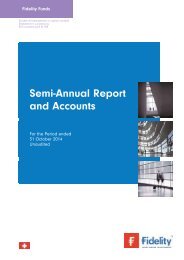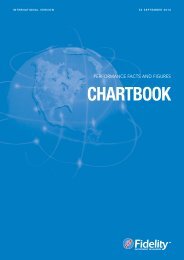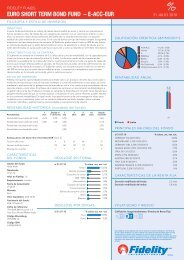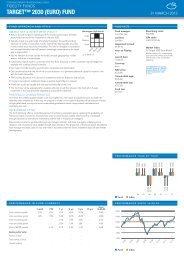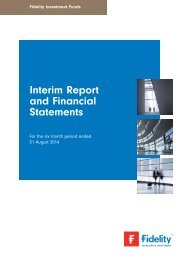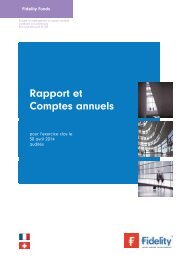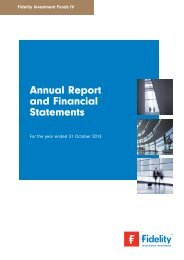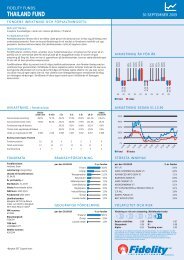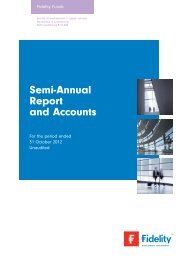Semi-Annual Reports and Accounts - Fidelity Worldwide Investment
Semi-Annual Reports and Accounts - Fidelity Worldwide Investment
Semi-Annual Reports and Accounts - Fidelity Worldwide Investment
Create successful ePaper yourself
Turn your PDF publications into a flip-book with our unique Google optimized e-Paper software.
FIDELITY TARGET 2020 FUNDINVESTMENT OBJECTIVE AND POLICYThe Fund’s investment objective is to achieve long term capital growth forinvestors planning to withdraw substantial portions of their investment in orafter the year 2020. The Fund’s policy is to invest in a wide range ofinvestments covering markets throughout the world, in accordance with anasset allocation that will become increasingly conservative as the year 2020is approached. The Fund will invest in other collective investment schemes(both regulated <strong>and</strong> unregulated), including schemes managed by <strong>Fidelity</strong>,<strong>and</strong> may also invest directly in transferable securities, money marketinstruments, cash <strong>and</strong> deposits. Derivatives <strong>and</strong> forward transactions may alsobe used for investment purposes.FUND MANAGER’S COMMENTARYMARKET REVIEWMost asset classes generated small but positive returns over the period.Energy prices rose due to the unseasonably cold winter in the US, while thedrought in Brazil drove up coffee prices to a record high. Meanwhile,improving economic data <strong>and</strong> continued monetary support from central banksin developed markets drove equities higher. However, gains were limited byworries about the impact of the reduction in money supply by the US FederalReserve (Fed), slow growth in China <strong>and</strong> rising geopolitical tensions inUkraine. At a regional level, equities in Europe ex UK, the US <strong>and</strong> the UK rose,but declined in Japan, emerging markets <strong>and</strong> Pacific ex Japan. Meanwhile, inthe fixed income segment, high yield <strong>and</strong> corporate bonds outperformedgovernment bonds.PORTFOLIO ACTIVITYThe selection of underlying managers in the equity segment of the portfolionegatively impacted returns. In Europe ex UK equities, stock picking byunderlying managers in the financials <strong>and</strong> technology sectors weakenedperformance. In the UK, positions in <strong>Fidelity</strong> UK Select Fund <strong>and</strong> <strong>Fidelity</strong>MoneyBuilder Growth Fund detracted from returns. The exposure to both fundswas reduced. In contrast, selection in emerging market equities boostedperformance. Stock picking in consumer discretionary <strong>and</strong> an underweightstance in energy <strong>and</strong> materials supported returns. Selection of underlyingmanagers in the fixed income segment also buoyed returns. Based on ourpositive view on global growth, we positioned the fund to benefit from animproving economic environment by maintaining a bias towards equities atthe expense of other asset classes. However, in equities, an overweight stancein the Asia Pacific region, notably the exposure to Japan, held back gains.Equities in Japan were hurt due to concerns over the impact of an increase inthe sales tax on consumption spending, <strong>and</strong> the lack of near term policy actionto counter the impact. The exposure to Japan was scaled down by selling thepositions in <strong>Fidelity</strong> Japan Smaller Companies Fund. Over the period, wemaintained a preference for US equities given my optimistic outlook for theregion. Positions were purchased in SPDR S&P US Dividend Aristocrats ETFFund, <strong>Fidelity</strong> Funds -American Growth Fund <strong>and</strong> FAST - US Fund. We believedthat slow growth in China, the largest consumer of industrial metals, will hurtcommodity prices. However, the underweight stance in the asset classdetracted from returns as commodities rose on the back of harsh weather.Nonetheless, we believe this was an unexpected short-term gain, <strong>and</strong> retainmy underweight in the sector.OUTLOOKThe macroeconomic environment remains broadly supportive of equities. At aregional level, the US is favoured on the back of improving corporate earnings<strong>and</strong> signs of stable growth. Equities in Japan could be volatile due to theimpact of the sales tax increase. Meanwhile, Pacific ex Japan <strong>and</strong> emergingmarkets could be hurt by weakening growth in China, the major export marketfor both regions. Elsewhere, the weather induced strength in commodities islikely to fade. In fixed income, global corporate bonds are expected tooutperform core government bonds as investors are attracted by the level ofincome they pay.PERFORMANCE RECORDDISCRETE 1 YEAR PERFORMANCE OVER THE LAST 5 YEARS TO:30/04/10 30/04/11 30/04/12 30/04/13 30/04/14A Accumulation Shares 28.7 7.9 -6.0 14.4 2.2* Comparative Index 29.1 10.1 -4.4 13.8 2.2* Comparative Index: The Comparative Index follows a roll down path designed to match the changingasset class exposure of the fund. The initial asset class exposure is 100% equity <strong>and</strong> this changes overtime as the fund approaches its maturity date, with bonds <strong>and</strong> then cash being introduced inincreasing amounts. The Comparative Index weights <strong>and</strong> components as at 30/04/2014. Comprises:17.1% FTSE All Share (Net), 11.4% MSCI Europe ex-UK (Net), 11.4% MSCI North America (Net), 11.4%MSCI AC Pacific (Net), 23% BofA ML Sterling Broad Mkt (Net), 10% GBP Overnight LIBOR, 10% DJ - UBSCommodity Index & 5.7% MSCI Emerging Markets (Net)Source: <strong>Fidelity</strong> <strong>and</strong> RIMES, bid to bid, UK£, net income reinvested. Pastperformance is not a realiable indicator of future results.RISK PROFILEIf you make regular withdrawals from your investment, this may reduce yourcapital over time if the fund’s growth does not compensate for the withdrawals.Some funds will invest in ‘sub-investment grade’ bonds. These bonds mayproduce a higher level of income than ‘investment grade’ bonds but at a higherrisk to your capital. With funds that invest in bonds, cash or other money marketinstruments there is a risk that the issuer may default. The likelihood of thishappening will depend on the credit-worthiness of the issuer. The risk of defaultis usually greatest with bonds that are classed as sub-investment grade. Somefunds are able to invest some or all of their assets in developing overseasmarkets which carry a higher risk than investing in larger established markets.<strong>Investment</strong>s in emerging markets are likely to experience greater rises <strong>and</strong> fallsin value <strong>and</strong> there may be trading difficulties. Some funds invest in overseasmarkets. This means that changes in currency exchange rates will affect thevalue of your investment. For some funds, derivatives <strong>and</strong> forward transactionsmay be used for specific investment purposes, as well as for hedging <strong>and</strong> otherefficient management purposes as permitted for all funds. Where this is thecase, their use may lead to higher volatility in the fund’s share price. For fundsthat use derivative transactions, there is a risk that the counterparty to thetransaction will wholly or partially fail to honour its contractual obligations. Thismay result in financial loss to the fund. We assess the creditworthiness ofcounterparties as part of our risk management process. The value of the fundmay be affected if any of the institutions with which cash is deposited suffersinsolvency or other financial difficulty. Each of our funds is operated as aseparate entity with its own assets <strong>and</strong> liabilities. However, if the liabilities ofone fund were to exceed its assets, the other funds within the scheme mighthave to transfer across money to cover the liabilities. This means that the fundyou invest in may be worth less if it has to transfer money to another fund.Joo Hee Lee & Eugene PhilalithisFund Manager30 April 14* Holdings can vary from those in the index quoted. For this reason thecomparative index is used for reference only.79



